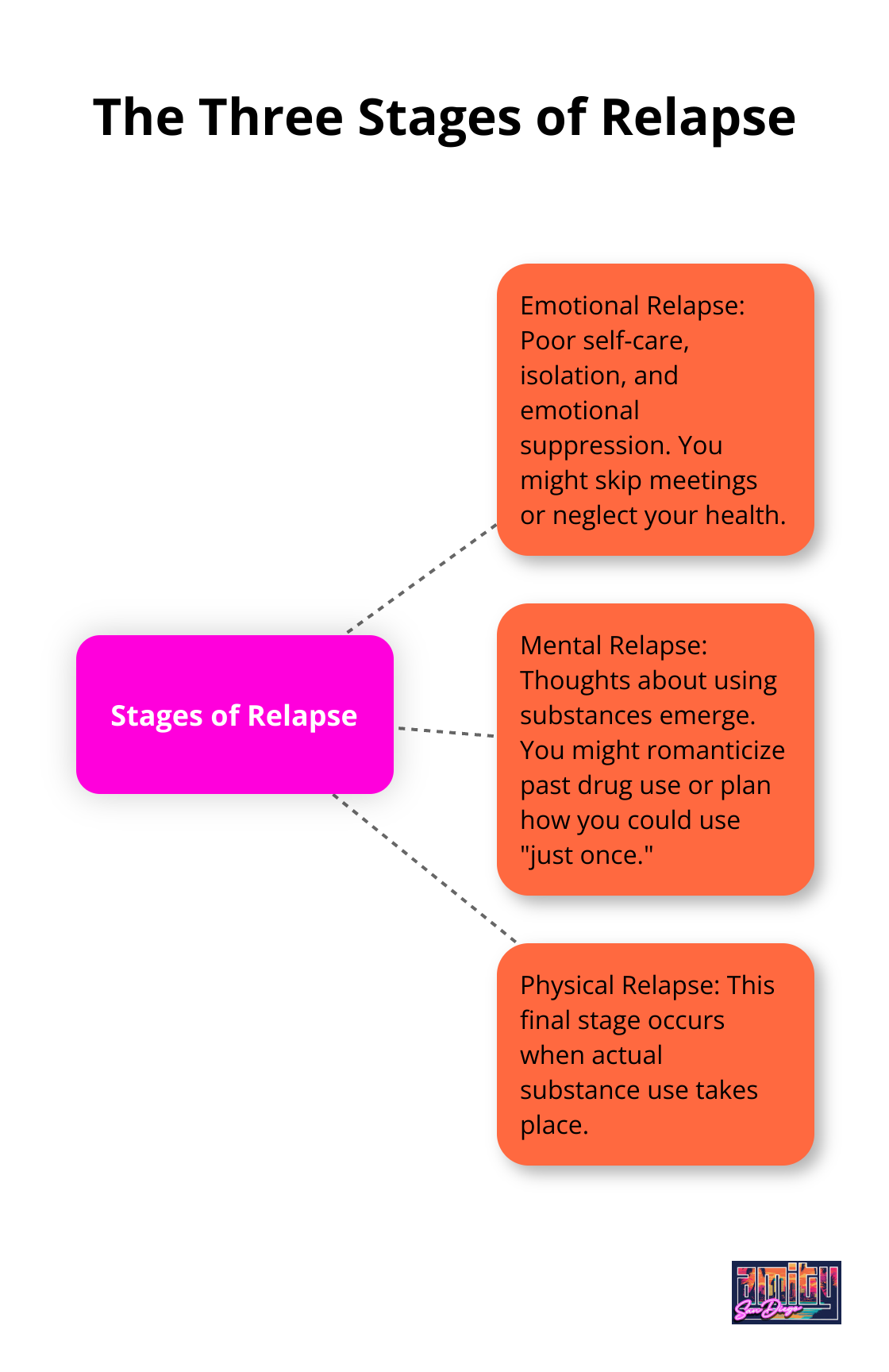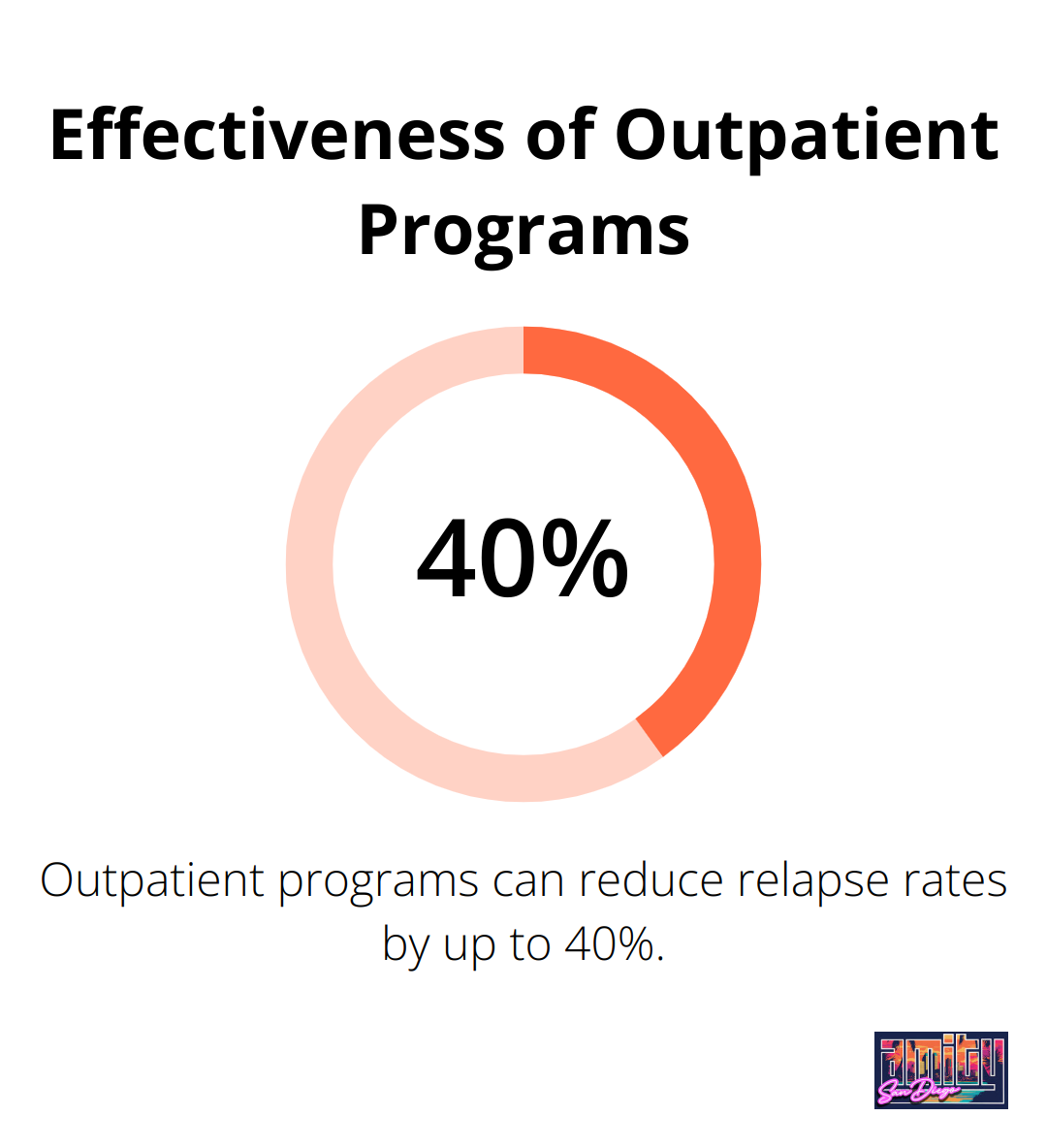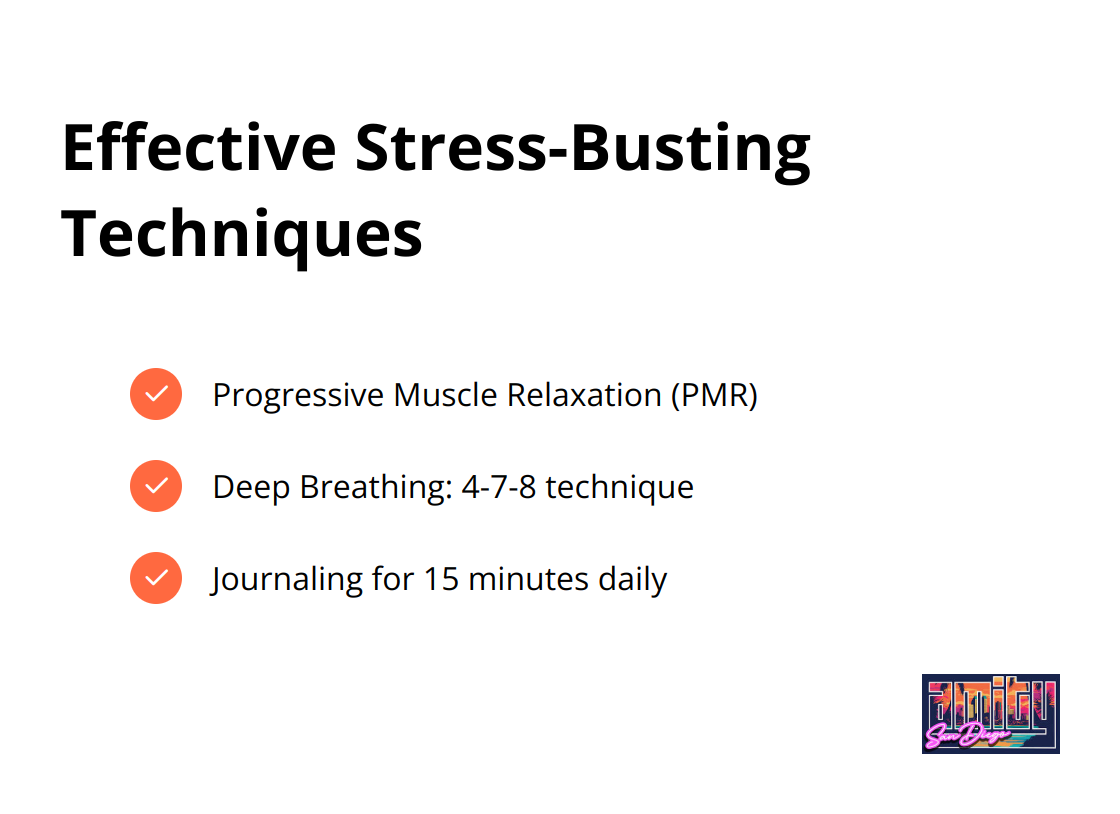At Amity San Diego, we understand that recovery is a journey with potential obstacles. Relapse prevention is a critical aspect of maintaining long-term sobriety.
In this blog post, we’ll explore key strategies to help you stay strong and avoid setbacks in your recovery process. These practical tools and techniques can empower you to build resilience and continue moving forward on your path to lasting wellness.
Understanding Relapse in Addiction Recovery
The Stages of Relapse
Relapse in addiction recovery unfolds as a complex process, often beginning long before actual substance use resumes. At Amity San Diego, we view relapse as a potential part of the recovery journey, not a failure. The process typically involves three stages:
- Emotional Relapse: This early stage manifests through poor self-care, isolation, and emotional suppression. You might skip meetings or neglect your health.
- Mental Relapse: During this stage, thoughts about using substances emerge. You might romanticize past drug use or plan how you could use “just once.”
- Physical Relapse: This final stage occurs when actual substance use takes place.
Understanding these stages enables you to recognize warning signs early and take action.

Common Relapse Triggers
Certain situations or emotions can increase the risk of relapse. Some frequent triggers include:
- Stress (work pressure, financial worries, or relationship conflicts)
- HALT (feeling Hungry, Angry, Lonely, or Tired)
- Social pressure (being around people who use substances)
- Negative emotions (depression, anxiety, or boredom)
- Overconfidence (thinking you’re “cured” and can handle just one drink)
Proactive Relapse Prevention Strategies
Prevention plays a key role in maintaining recovery. Here are some strategies we recommend:
- Develop a relapse prevention plan: Identify your personal triggers and create specific coping strategies for each.
- Practice self-care: Prioritize sleep, exercise, and nutrition. These basics significantly impact your mental state.
- Build a support network: Regular attendance at support groups or therapy sessions provides accountability and guidance.
- Learn stress management techniques: Try meditation, deep breathing, or progressive muscle relaxation.
- Stay engaged in treatment: Consistent participation in outpatient programs or therapy sessions reinforces recovery skills.
- Use the HALT check: Regularly assess if you’re Hungry, Angry, Lonely, or Tired, and address these needs promptly.
- Plan for high-risk situations: If you know you’ll encounter a triggering environment, have an exit strategy and a supportive person on call.
Three common strategies for relapse prevention include therapy and skill development, medications, and monitoring.
The Importance of Early Intervention
Seeking help at the first sign of struggle isn’t weakness – it’s a smart, proactive step in your recovery journey. If you feel at risk of relapse, reach out to your support network or contact a professional immediately.
As we move forward, let’s explore how building a strong support network can significantly enhance your relapse prevention efforts and overall recovery journey.
Building Your Recovery Support System
The Role of Family and Friends
Your loved ones form the foundation of your recovery support. To strengthen these relationships:
- Educate your inner circle about addiction and recovery (The National Institute on Drug Abuse offers free resources for families).
- Set clear boundaries. Communicate your needs and identify potential triggers.
- Plan sober activities together (game nights, outdoor adventures, etc.).
- Encourage participation in Al-Anon or Nar-Anon meetings for their own support.
The Power of Peer Support Groups
Support groups like Alcoholics Anonymous (AA) and Narcotics Anonymous (NA) offer invaluable peer connections. These groups:
- Foster understanding through shared experiences.
- Provide a structured approach to recovery (12-step program).
- Offer one-on-one guidance through sponsorship.
- Create accountability and routine.
Professional Support: A Key to Recovery
Professional counseling and addiction treatment services address the complex nature of addiction. This support includes:
- Evidence-based therapies (Cognitive Behavioral Therapy, Dialectical Behavior Therapy) to address underlying issues.
- Dual diagnosis treatment for co-occurring mental health conditions.
- Ongoing support through outpatient programs (studies show these can reduce relapse rates by up to 40%).
- Family therapy to heal relationships and improve communication.

SAMHSA’s National Helpline is a free, confidential, 24/7, 365-day-a-year treatment referral and information service (in English and Spanish) for individuals and families facing mental and/or substance use disorders.
Building Your Support Network
Creating a strong support network takes time and effort. Be patient with yourself and others as you navigate this process. The relationships you build now will form the foundation of your long-term recovery success.
As we move forward, let’s explore how developing healthy coping mechanisms can further strengthen your relapse prevention toolkit and enhance your overall recovery journey.
Mastering Healthy Coping Skills
Stress-Busting Techniques That Work
Stress often triggers relapse, but effective countermeasures exist. Try these proven methods:

- Progressive Muscle Relaxation (PMR): Studies have shown that PMR can benefit stress levels in persons with addictive behaviors.
- Deep Breathing: The 4-7-8 technique activates the parasympathetic nervous system, lowering heart rate and blood pressure in minutes.
- Journaling: Spend 15 minutes a day writing about stressful events to significantly reduce stress levels.
Mindfulness: Your Secret Weapon
Mindfulness packs a powerful punch in recovery. A study found that mindfulness-based relapse prevention (MBRP) can decrease impulsivity scores in opioid-dependent individuals and reduce relapse probability compared to treatment as usual (TAU).
Start with these simple practices:
- Body Scan: Focus on each part of your body for 5 minutes daily, releasing tension.
- Mindful Walking: Take a 10-minute walk, concentrate solely on your steps and surroundings.
- Urge Surfing: Observe cravings without judgment when they hit.
Fuel Your Recovery with Exercise and Nutrition
Physical health directly impacts mental well-being and recovery success. Studies reveal that individuals who engage in regular aerobic exercise are less likely to use and abuse illicit drugs.
- Try 30 minutes of moderate exercise 5 days a week. Even a brisk walk counts!
- Consider yoga – it reduces stress and improves mood.
- Eat a balanced diet rich in omega-3 fatty acids, which support brain health.
Hobbies: Your New Healthy High
Meaningful activities replace addictive behaviors.
- Creative pursuits: Art therapy reduces anxiety and increases self-esteem. Adult coloring books offer a low-pressure start.
- Volunteering: Help others to boost mood and provide a sense of purpose. Look for opportunities at local animal shelters or food banks.
- Learn a new skill: Master cooking, coding, or playing an instrument to build confidence and occupy your mind.
Final Thoughts
Relapse prevention requires ongoing effort and commitment. We at Amity San Diego understand that the journey to sobriety isn’t always linear, but with the right tools and support, you can overcome challenges. Our team of experienced professionals provides personalized, evidence-based treatment in a supportive environment to guide you through every step of your recovery journey.
Your recovery journey is worth every effort, and we’re here to support you. We offer the tools and support you need to build a fulfilling, substance-free life. Don’t hesitate to reach out for help when you need it (connecting with a support group, talking to a trusted friend, or seeking professional guidance can prevent minor setbacks from escalating).
Stay committed to your recovery and celebrate your progress. With perseverance and the right support, you can achieve lasting sobriety. Contact Amity San Diego today to learn more about our comprehensive relapse prevention programs and take the next step towards a healthier, happier you.



